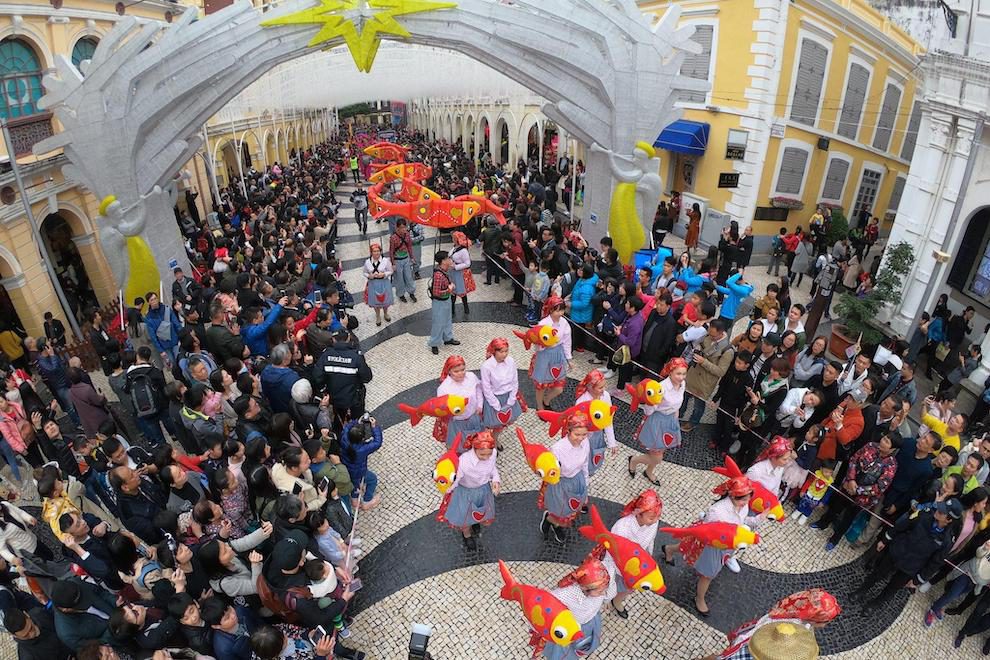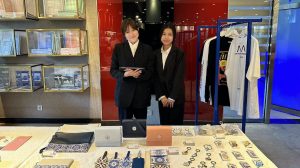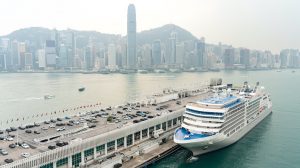Macao International Parade appears to be a “successful case” – in a “postcolonial destination” context – of an event that is able to enhance identification among locals with national identity. So says a research paper involving an alumna and a scholar from IFTM.
The parade has been able to achieve this by making use of “an entertaining celebration” that is only “softly associated” with the handover to Chinese administration from that of Portugal and with Chinese national identity, say the researchers.
“Organising a cultural festival to celebrate the city’s uniqueness and newly-acquired identity may be a better means” to achieve identity-formation than by directly imprinting “multiple Chinese political symbols” on locals, wrote the authors of the research. “This soft process, more reliant on the social and cultural aspects,” than other forms of identity-building, has “proved to be useful to generate positive emotions.”
The comments were featured in the paper “National identity and cultural festivals in postcolonial destinations”, produced by 4 international researchers, including IFTM alumna Dr. Carol Xiaoyue Zhang – now a scholar at the University of Nottingham in the United Kingdom – and IFTM scholar Dr. Tuan Phong Ly (Jack). The other authors were Dr. Lawrence Hoc Nang Fong from the University of Macau, and Dr. Shina Li from Sun Yat-sen University, in Mainland China. The work was published last year in the academic journal Tourism Management.
This was not the first academic paper on postcolonial identity to bring together Dr. Zhang and Dr. Ly. Previously they jointly wrote – along with 2 other scholars – the paper “Politics of memories: Identity construction in museums”, published in 2018 in the Annals of Tourism Research. It analysed commentaries available at the Hong Kong Museum of History and Macao Museum respectively, used to describe exhibits to local and international visitors.
Macao was hired and administered by Portugal for centuries, until 1999, when it was returned to Chinese control, becoming a Special Administrative Region of China.
Hybrid identity
In the “National identity and cultural festivals in postcolonial destinations” paper, the authors pointed out that Macao’s “hybrid identity” – often described as ‘East meets West’ – revealed that the city’s identity had “not yet become purely Chinese.” The Macao International Parade “symbolises a softer process to legitimate the Chinese national identity,” associating the handover with “the celebratory atmosphere of a festival to generate positive emotions and inform identity,” said the researchers.
The annual Macao International Parade – known until 2016 as “Parade through Macao, Latin City” – has been held annually by the city’s Cultural Affairs Bureau since 2011. The parade features performing groups from around the world and local artists. Its route includes places that are part of the UNESCO-listed Historic Centre of Macao. The event attracts thousands each year.
According to the researchers, the parade has “a clear political agenda to celebrate Macao’s handover and bring the community together.” While festivals elsewhere “have often utilised their own cultural heritage symbols to reinforce significant historical events, this festival seems to reuse [Macao’s] Portuguese legacy to celebrate its newly acquired Chinese identity.”
They added that “downplaying” the “colonial legacy” of Macao through “transferring the colonial cultural [heritage] to a multi-culture” event, further helped the Macao International Parade’s national identity-forming function.
The authors used a mixture of methods for their research. There was a qualitative study to investigate the rationale for organising festivals to celebrate postcolonial hybrid identities, taking as an example the Macao International Parade. There was also a quantitative study using a survey – collecting a total of 255 valid responses from parade-goers – to investigate the socio-political role that festivals play in postcolonial destinations.
“For a new postcolonial destination, such as Macao, the historical event that changed its identity from a colony to a Special Administrative Region of China is magnificent,” said the researchers. “Encouraging positive emotions towards the handover” – via the parade – “should eventually legitimate Macao’s newly-acquired Chinese national identity,” they added.
The researchers indicated that similar situations were “widely visible” in other postcolonial destinations with hybrid identities. In such places, the organisation of cultural festivals and events also went through “a process similar to Macao, where identities are negotiated to demonstrate local uniqueness and international position.”
More info
University of Macau Associate Professor Dr. Lawrence Hoc Nang Fong holds a PhD in hotel and tourism management from the Hong Kong Polytechnic University. His research areas include tourist behaviour, the impact of casinos on communities, and the effects of online reviews.
Dr. Shina Li is a Professor at the School of Tourism Management at Sun Yat-sen University, in Mainland China. She has a background in tourism economics and her research interests cover tourism and event-impact evaluation. Dr. Li has a PhD from the University of Nottingham in the U.K.
Dr. Tuan Phong Ly (Jack) is a Visiting Assistant Professor at IFTM. He holds a PhD from the Hong Kong Polytechnic University. His research interests include ecotourism, national park model management, cultural heritage management, tourism development in Southeast Asia, and museum development. He teaches tourism management and culture-related subjects at IFTM.
Carol Xiaoyue Zhang, Lawrence Hoc Nang Fong, ShiNa Li and Tuan Phong Ly: “National identity and cultural festivals in postcolonial destinations”, Tourism Management, Volume 73, pages 94-104, 2019.
https://doi.org/10.1016/j.tourman.2019.01.013









